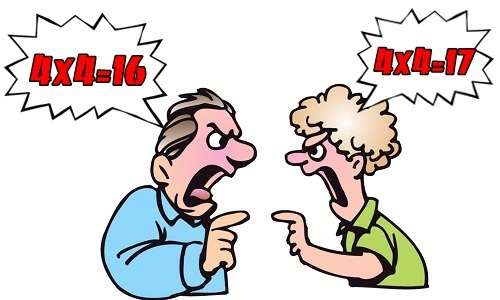Confirmation bias constitutes a pervasive cognitive propensity that impacts each individual, irrespective of our awareness of its presence. This tendency propels us to gravitate towards evidence that bolsters our preconceived notions, while concurrently disregarding or overlooking data that challenges them.
In the midst of an incessant deluge of information and viewpoints, confirmation bias exerts a profound influence on our choices and convictions. Comprehending this partiality is of paramount importance for making judicious determinations, scrutinizing our suppositions, and attaining a more profound grasp of the world that envelops us. Thus, if you yearn to delve deeper into the realm of confirmation bias and its ramifications, brace yourself and prepare for an enlightening sojourn into the labyrinth of the human psyche.
LotusBuddhas is eager to share this psychological concept with you. It is truly amazing! It is sure to surprise you and make you burst with emotions as you realize how your mind has been deceiving you for so long.
Definition of confirmation bias
Confirmation bias, a pivotal concept in the field of cognitive psychology and social sciences, refers to the human propensity to seek, interpret, and remember information that affirms their preexisting beliefs, values, and expectations. This innate cognitive bias exerts a profound influence on the way individuals perceive, process, and assimilate information.
Confirmation bias is fundamentally a type of selective thinking where one tends to favor information that aligns with one’s preconceived notions while concurrently ignoring, dismissing, or undermining evidence that contradicts or challenges those views. It manifests in various forms such as actively seeking out confirmatory information, offering greater credence to supporting evidence, or discounting or misinterpreting disconfirming evidence.
The potency of confirmation bias lies in its subtlety, often operating on an unconscious level, leading to skewed judgment and decision-making processes. This can lead to a variety of adverse consequences, including reinforcing stereotypes, fostering discriminatory practices, or encouraging misinformation or flawed reasoning.
The role of confirmation bias is significant in a broad array of contexts, including but not limited to political decision-making, business strategies, scientific research, and interpersonal relationships. For instance, in politics, confirmation bias can contribute to increased polarization, where individuals only acknowledge information that supports their political ideology while rejecting or neglecting evidence that contradicts it.
Although confirmation bias is an inherent aspect of human cognition, measures can be adopted to mitigate its effects, such as fostering critical thinking, promoting intellectual humility, or employing techniques of debiasing. It is crucial to note that recognizing and addressing confirmation bias is a critical step towards the pursuit of objective understanding and rational decision-making.
Origin of the term “confirmation bias”

The term “confirmation bias” traces its origins to Peter Wason, a renowned British psychologist, during the 1960s. Wason orchestrated a sequence of experiments that illuminated the propensity of individuals to pursue information aligning with their pre-existing convictions and suppositions, while disregarding information that defies them.
In one of his seminal experiments, Wason presented participants with a triad of numerical figures (2-4-6) and tasked them with discerning the underlying principle governing the arrangement. The majority of participants surmised that the rule encapsulated “ascending even numbers” and subsequently examined this conjecture by suggesting alternate sequences adhering to the same criterion. However, Wason’s authentic rule was considerably more elementary: “any three ascending numbers.” Consequently, participants succeeded in corroborating their preliminary hypothesis but failed to evaluate it against alternative propositions or to uncover the actual governing rule.
Wason’s experiments unveiled the human inclination towards “confirmation seeking” conduct, wherein individuals actively pursue evidence that reinforces their beliefs, rather than subjecting those beliefs to alternative hypotheses or contemplating evidence that opposes them. The term “confirmation bias” was later embraced by fellow researchers to characterize this predisposition, and it has since evolved into a widely acknowledged notion within psychology and an array of other disciplines.
Types of confirmation bias
Confirmation bias, as a broad cognitive concept, manifests in a variety of specific ways, reflecting the diverse methods through which it affects our information processing and decision-making. Here are the primary types of confirmation bias:
- Selective exposure: This type of confirmation bias refers to an individual’s tendency to favor and seek out information or evidence that is in line with their preexisting beliefs or hypotheses while actively avoiding information that challenges them. For example, in the political sphere, an individual may choose to consume news primarily from sources that align with their political leaning, ignoring outlets with different perspectives.
- Selective perception: In selective perception, individuals interpret ambiguous information or evidence in a way that confirms their existing beliefs or expectations. It’s the psychological process that affects how people perceive and make sense of new information.
- Selective retention: This form of confirmation bias involves remembering information selectively. Individuals tend to recall information more accurately and vividly when it supports their beliefs, values, or expectations, whereas they may forget or distort information that contradicts them.
- Biased interpretation: This type of confirmation bias refers to the propensity of individuals to give more weight or validity to evidence that supports their existing beliefs while discounting or misinterpreting evidence that contradicts them. For instance, in a scientific research context, a researcher might overvalue the significance of findings that align with their hypotheses and undervalue contradictory findings.
- Biased evaluation: This occurs when individuals apply different standards for evaluating confirming and disconfirming evidence. This might involve rigorous scrutiny of disconfirming evidence while accepting confirming evidence without much skepticism or verification.
- Confirmation bias in inquiry: This refers to a tendency to ask questions or devise investigations in ways that are likely to produce affirming answers or results. For example, in an interview, a person might ask leading questions that encourage responses which confirm their preexisting beliefs.
These varied forms of confirmation bias underscore the pervasive influence it has on our thinking and decision-making processes. Understanding these types can facilitate better recognition of this bias and potentially foster strategies to mitigate its impact, ultimately encouraging more objective, rational thought processes.
Examples of confirmation bias
Confirmation bias can be illustrated across a multitude of contexts, from everyday life situations to complex decision-making processes in various fields. Here are several illustrative examples:
- Religious confirmation bias: In matters of faith and religion, confirmation bias can often lead individuals to interpret religious texts, doctrines, or experiences in a way that aligns with their pre-existing beliefs. For instance, a religious person might witness an event and perceive it as a divine intervention or miracle that reaffirms their faith, disregarding alternative, possibly more mundane explanations. Conversely, skeptics might interpret the same event as a mere coincidence or attribute it to natural causes, reinforcing their atheistic or agnostic viewpoint.
- Social confirmation bias: Within social settings, individuals often selectively interpret others’ behavior based on their preconceived impressions or expectations of them. For example, if one labels someone as unfriendly based on a single interaction, they might continue to focus on instances that validate this label while ignoring or discounting instances that contradict it.
- Political confirmation bias: A poignant example of confirmation bias lies in the political realm. Individuals with strong political convictions tend to consume news from sources that align with their political ideologies, often disregarding or disputing information from outlets with opposing views. For instance, a conservative individual may predominantly consume news from conservative-leaning media outlets, valuing the information as accurate and dismissing reports from more liberal sources as biased or inaccurate.
- Medical confirmation bias: In the medical field, physicians may form an initial diagnostic hypothesis based on a few key symptoms and subsequently seek out information that confirms this hypothesis while ignoring or dismissing contradictory evidence. This could potentially lead to misdiagnosis or delayed diagnosis.
- Investment confirmation bias: In the financial realm, an investor might hold a belief about a particular stock or market trend. They may then selectively interpret market data or financial news in a manner that supports this belief, neglecting data or analysis that contradicts their investment thesis. This could lead to suboptimal investment decisions.
- Educational confirmation bias: Teachers, based on initial impressions, may develop specific expectations about a student’s capabilities or behavior. They may then give more attention to the student’s actions that align with these expectations and overlook or undervalue the actions that contradict them, potentially affecting the student’s academic progress and self-concept.
- Scientific confirmation bias: In scientific research, a researcher might develop a hypothesis and unintentionally design the experiment or interpret the data in a way that confirms the initial hypothesis, ignoring or underestimating evidence that challenges it. This can lead to flawed conclusions and inhibit scientific progress.
Why do we have a tendency towards confirmation bias?

Confirmation bias is not merely a random occurrence but a product of evolutionary, cognitive, and motivational factors that together shape our thinking and reasoning processes. Here are several reasons why humans demonstrate a propensity towards confirmation bias:
- Cognitive economy: Humans are cognitive misers, seeking to preserve mental resources whenever possible. Sifting through a plethora of information, especially when it contradicts our existing beliefs, requires significant cognitive effort. In contrast, confirming pre-existing beliefs is mentally less taxing, aligning with our tendency to conserve cognitive resources.
- Consistency and cognitive dissonance: Consistency is a fundamental aspect of human cognition and behavior. Individuals desire to maintain consistency in their attitudes, beliefs, and behaviors. Confirmation bias aids in this endeavor by endorsing existing beliefs and rejecting contradicting information, thus reducing cognitive dissonance – the uncomfortable state caused by holding two or more contradictory beliefs, attitudes, or values.
- Defensive motivation: Confirmation bias also serves a defensive function. People often identify strongly with their beliefs, viewing them as extensions of their self-concept. Confirming information strengthens these beliefs and, by extension, one’s sense of self, while contradicting information threatens them. Therefore, confirmation bias can protect one’s self-esteem and identity.
- Evolutionary adaptation: From an evolutionary perspective, rapid decision-making often takes precedence over accurate decision-making, especially under conditions of uncertainty or threat. By allowing individuals to quickly gather and process information that aligns with their existing mental models, confirmation bias might have provided an evolutionary advantage by facilitating faster decision-making.
- Heuristics and biased assessments: Heuristics are cognitive shortcuts or ‘rules of thumb’ that individuals use to simplify complex decision-making processes. However, these shortcuts can lead to biased assessments. For example, the availability heuristic, where people judge the likelihood of events based on how easily examples come to mind, can reinforce confirmation bias by making confirming evidence seem more prevalent or convincing.
- Expectancy confirmation: Also known as the self-fulfilling prophecy, this theory suggests that people’s expectations lead them to act in ways that make those expectations come true. This behavior can reinforce confirmation bias, as people will selectively observe the outcomes that confirm their expectations, while ignoring those that don’t.
Understanding the reasons behind the prevalence of confirmation bias can help in crafting strategies to counteract its effects, fostering a more balanced and objective approach to information processing and decision-making.
Is confirmation bias good or bad?
Confirmation bias is often considered detrimental. However, like many aspects of human cognition, it isn’t categorically ‘good’ or ‘bad.’ Instead, its implications can be context-dependent, exhibiting both potentially beneficial and harmful effects.
On one hand, confirmation bias can have negative implications:
- Impedes objective decision-making: Confirmation bias can hinder our ability to make objective, well-informed decisions. By favoring information that supports our existing beliefs and ignoring contradicting evidence, we risk making decisions based on a skewed perception of reality.
- Promotes polarization and echo chambers: In political and social contexts, confirmation bias can contribute to increased polarization, fostering “us versus them” mentalities. It also aids in creating echo chambers, where individuals are exposed only to viewpoints that align with their own, limiting their understanding and acceptance of diverse perspectives.
- Obstructs learning and growth: Constantly seeking confirming evidence can restrict our learning and intellectual growth. By not challenging our beliefs or considering alternative viewpoints, we limit our knowledge and understanding.
On the other hand, confirmation bias can sometimes have beneficial aspects:
- Simplifies information processing: We are often faced with an overwhelming amount of information. Confirmation bias can help simplify the decision-making process by allowing us to quickly identify and prioritize information that aligns with our existing beliefs, reducing cognitive load.
- Maintains self-concept and reduces cognitive dissonance: Confirmation bias can help preserve our self-esteem and identity by reinforcing our beliefs and values. It also helps reduce cognitive dissonance, the mental discomfort experienced when holding conflicting beliefs or values.
- Promotes mental efficiency: From an evolutionary perspective, rapidly assessing situations and making quick decisions can be advantageous, particularly in situations where prolonged analysis might be impractical or dangerous. By enabling swift decision-making based on established beliefs, confirmation bias might facilitate mental efficiency.
In conclusion, while confirmation bias can lead to flawed reasoning and decision-making, it’s also an integral part of how our minds work, with some potential advantages. The key lies in being aware of this bias and consciously working to mitigate its harmful effects when critical, objective decision-making is required. A balanced approach to information, one that values contrary evidence as well as confirming, encourages broader understanding and more effective decisions.
How to avoid confirmation bias
Avoiding or mitigating the effects of confirmation bias, a deeply ingrained cognitive bias, requires conscious effort and the application of critical thinking skills. Here are several strategies that can be adopted to counteract the influence of confirmation bias:
- Awareness and recognition: The first step towards mitigating confirmation bias is to acknowledge its existence and recognize its influence on our thinking and decision-making processes. This involves understanding the nature of confirmation bias and being mindful of situations where it is likely to manifest.
- Encourage diverse viewpoints: Actively seek out perspectives and opinions that differ from your own. This can be done by engaging with diverse sources of information, interacting with people from different backgrounds or with differing viewpoints, and consciously considering alternative hypotheses or explanations.
- Foster critical thinking: Develop and practice critical thinking skills. This involves evaluating evidence objectively, questioning assumptions, considering the source of information, and being aware of potential logical fallacies. Critical thinking serves as a powerful tool in discerning the validity and reliability of information, helping to counteract confirmation bias.
- Consider the opposite: To balance the inclination towards confirmation bias, deliberately contemplate the opposite of what you believe to be true. This exercise, known as ‘consider the opposite’ strategy, can help bring to light information or perspectives that may have been overlooked or dismissed due to confirmation bias.
- Objective decision-making techniques: Utilize decision-making techniques designed to minimize bias, such as using decision matrices, decision trees, or conducting a SWOT analysis (Strengths, Weaknesses, Opportunities, Threats). These techniques encourage a systematic review of all relevant information and considerations, not just those that support a preferred outcome.
- Feedback and red team strategies: Encourage feedback and engage in ‘red teaming,’ a process wherein a group of independent individuals challenge an organization’s strategy, looking for potential flaws or biases. These strategies provide an outside perspective that can help identify and correct confirmation bias.
- Promote intellectual humility: Cultivate a mindset of intellectual humility, acknowledging the possibility of being incorrect and being open to changing one’s beliefs in light of new evidence. This mindset can reduce the tendency to favor confirming evidence and dismiss contradicting evidence.
- Debiasing techniques: Employ debiasing techniques that have been proven to reduce confirmation bias, such as perspective-taking, delay in decision-making to allow for a more comprehensive evaluation of information, and pre-mortem analysis (considering the failure of a decision before it has been made).
While it may be challenging to completely eliminate confirmation bias due to its ingrained nature, these strategies can significantly mitigate its impact, fostering more balanced, objective, and informed decision-making.
Advice from Buddhism to overcome confirmation bias
When it comes to personal development and enhancing our decision-making, Buddhism, one of the world’s oldest spiritual traditions, offers a wealth of wisdom that’s relevant even in our modern, fast-paced lives. One of these areas is overcoming confirmation bias – that sneaky cognitive blind spot that can lead us to make flawed decisions without even realizing it. But how exactly does Buddhism help us tackle this tricky cognitive bias? Let’s dive right in.
Mindfulness: At the core of Buddhist practice is the principle of mindfulness – a heightened state of awareness and presence in the moment. Mindfulness encourages us to observe our thoughts and emotions non-judgmentally. It’s like hitting the pause button on our autopilot thought processes, giving us a chance to recognize when we’re falling into the confirmation bias trap. By practicing mindfulness, we’re training ourselves to spot when we’re favoring information that confirms our pre-existing beliefs and dismissing evidence that contradicts them.
Right View: In Buddhism, the concept of “Right View” or “Right Understanding” is the first step in the Eightfold Path. It encourages a clear understanding of the realities of life and the world. In the context of confirmation bias, Right View means being open to different perspectives and willing to adjust our beliefs when presented with credible contradicting information. This can be a powerful antidote to the rigid thinking patterns that confirmation bias often promotes.
Non-Attachment to views: Buddhism emphasizes non-attachment, even to our views and beliefs. By practicing non-attachment, we’re creating a mental flexibility that allows us to question our beliefs, remain open to new information, and be willing to let go of outdated or incorrect beliefs. This openness and flexibility are key in overcoming confirmation bias.
Wisdom and Discernment: Buddhism underscores the importance of wisdom and discernment (Prajna). When we develop discernment, we learn to distinguish between beneficial and harmful beliefs, between truth and fallacy. This ability to discern encourages us to critically evaluate information before accepting or dismissing it, helping us to avoid the pitfalls of confirmation bias.
Meditation: Regular meditation, a cornerstone of Buddhist practice, helps cultivate a clear and focused mind. It can enhance our self-awareness and enable us to observe our thought patterns – including biases – more objectively. Through meditation, we’re better equipped to notice when our judgment is being clouded by confirmation bias and can then work towards more balanced decision-making.
Buddhism offers a treasure trove of practical tools and philosophies that can help us tackle confirmation bias and improve our decision-making. So why not give these practices a go? You might be surprised at just how much clarity and objectivity they can bring to your everyday choices. Remember, as with any skill, overcoming confirmation bias takes practice. But with mindfulness, the Right View, non-attachment, wisdom, discernment, and meditation, you’ll be well-equipped to tackle confirmation bias head-on. Happy practicing!









